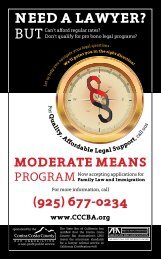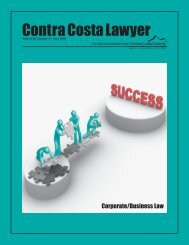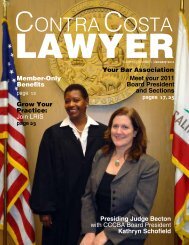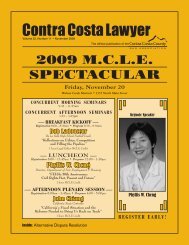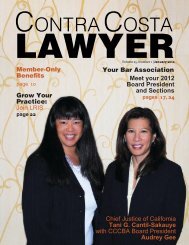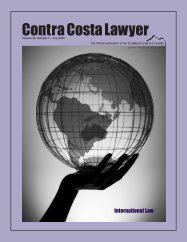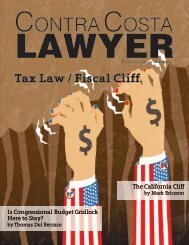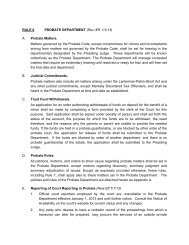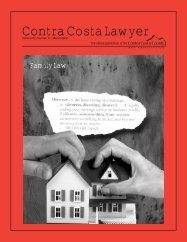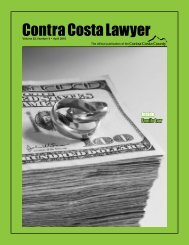download - Contra Costa County Bar Association
download - Contra Costa County Bar Association
download - Contra Costa County Bar Association
- No tags were found...
You also want an ePaper? Increase the reach of your titles
YUMPU automatically turns print PDFs into web optimized ePapers that Google loves.
1990, it was 15 months; in 2001 it was 39 months. We arecurrently 64 months into what is a recession for thoseemployed and a depression for those who are not. Companieshave remained profitable by cutting costs, andlegal costs have been at the top of their lists. In-housecounsel budgets have been cut by 50 percent in somecases. About half of corporate counsel and private attorneysbelieve the recession will permanently change theway business is done in the legal industry. Companiesare becoming more sophisticated when they go outsidefor legal representation. This has led to increased consolidationamong the largest firms and the layoff of 9,500lawyers in 2009 and 2010. That’s one in every 76 lawyers.The largest law firms are not addressing the new norm(more value for less fees) and as a result are losing business.I would expect a trickle-down effect to our smallerfirms.Wealth in this country is becoming more concentrated.The top 1 percent owns 40 percent of the wealth, or225 times the wealth of the typical American. The ratioof CEO annual compensation for the Fortune 500 companiesto that of the typical worker is 234 to one versus16 to one in Japan. Income growth for the bottom 90 percenthas been 15 percent over the past 30 years. For thetop 1 percent it has been 300 percent. Lawyers routinelyraise their rates around 5 to 10 percent per year. This effectivelyeliminates the bottom 90 percent from representation.The number of people that can afford justiceis rapidly diminishing.The wealthiest 1 percent can afford representation andwill be willing to pay the premium for lawyers that candeliver (the Boies of the world). However, with moneyfor expertise, one must assume that they, as well as thelarge corporations, will become more sophisticated consumersof legal services.Any analysis of the markets leads one to conclude thatthe price of legal advice and representation will comedown. We will no longer be able to charge for work forwhich we are overqualified to do. Clients are drivingchange by pushing efficiency and demanding the use ofthe latest technology. Clients want to see value and areforcing firms to unbundle. Clients will seek lower-costservice providers including online services.Throughout the world, countries are allowing thepractice of law to evolve. England (from where our lawevolved) and Australia allow non-lawyers to providemany services considered legal. In America, we haveLegalZoom, Axiom Law, Clearspire, Rocket Lawyer,Practical Law Company, Huron, Mindcrest, Pangea3and Novus Law. Online dispute resolution has provedtremendously successful. New York City, using Cybersettle,saved $11.6 million during its first year of a demonstrationproject. SquareTrade, eBay’s preferred disputeresolution provider, offers two services: a free web-basedforum which allows users to attempt to resolve their differenceson their own, or if necessary, the use of a professionalmediator.Qatar is spending billions on developing a legal systemthat it hopes will facilitate incoming capital flows.Our position as the reserve capital of the world is basedin part upon the availability of our courts and the stabilityof our statutory and case law. Today, we are dismantlingour courts for lack of funds. Tomorrow’s litigatorsare going to have to navigate a world of less access andalternative dispute resolution options. Interestingly,American law students increasingly want to go to workfor the government, a trend not seen elsewhere.In Joe’s case, lawyers provide three value-added services.We are the trusted advisor who provides customizedadvice for our clients based upon our knowledge oftheir situations, the provider of risk management complianceand the agent for dispute resolution and litigation.This is particularly true in risk management, whichreceives little emphasis in most law firms. We need tolearn how to do each task most cost-effectively. We needto develop practices where Joe seeks the advice, experienceor expertise that he cannot find online. We needto become experts in areas not widely understood. Weneed to become online providers, and probably available24 hours a day or we risk losing our clients. And inthis world of connectivity where the reply button is alltoo alluring, we need to become experts in quality control.Here in <strong>Contra</strong> <strong>Costa</strong> <strong>County</strong>, we have a million residents.One out of every 250 (3,938) residents is a lawyer,versus one out of 400 nationwide. Forty-two percent ofus (yes, even me) are over 55. Twenty-eight percent havebeen in practice for less than five years or are under 35.I suspect that our county, which is primarily white andwealthy, will not be on the leading edge of change. Butthere is no question that the next 20 years will not mirrorthe last 20 years. It certainly gives us pause to think. sThis article was adapted from a presentation made by Dick Frankelto the <strong>Contra</strong> <strong>Costa</strong> <strong>County</strong> <strong>Bar</strong> <strong>Association</strong> Board of Directors.Mark Ericsson is a partner in the tax and businessfirm of Youngman & Ericsson, has served as the 2006president of the CCCBA and is currently the chair of theTaxation Section. He has written over 30 articles on taxand business issues.CONTRA COSTA COUNTY BAR ASSOCIATION CONTRA COSTA LAWYER 25



